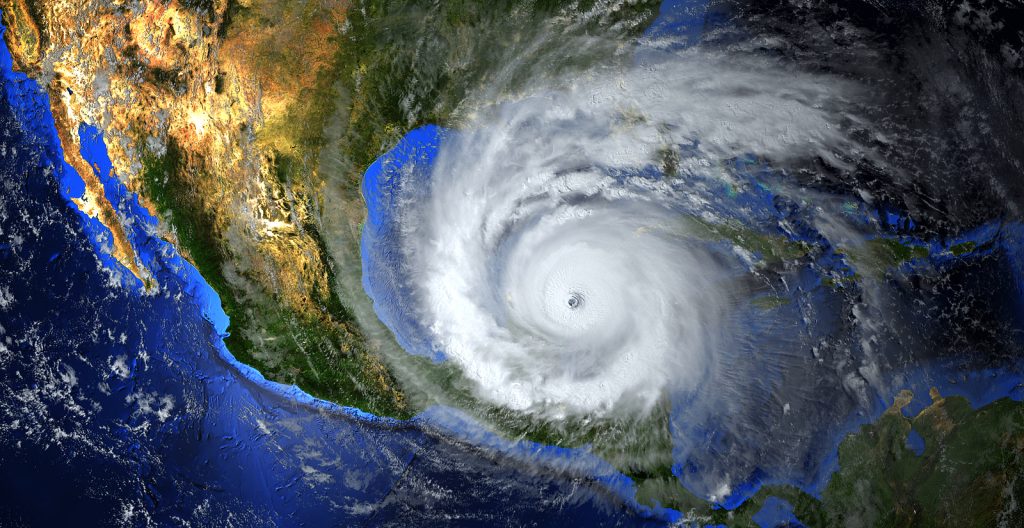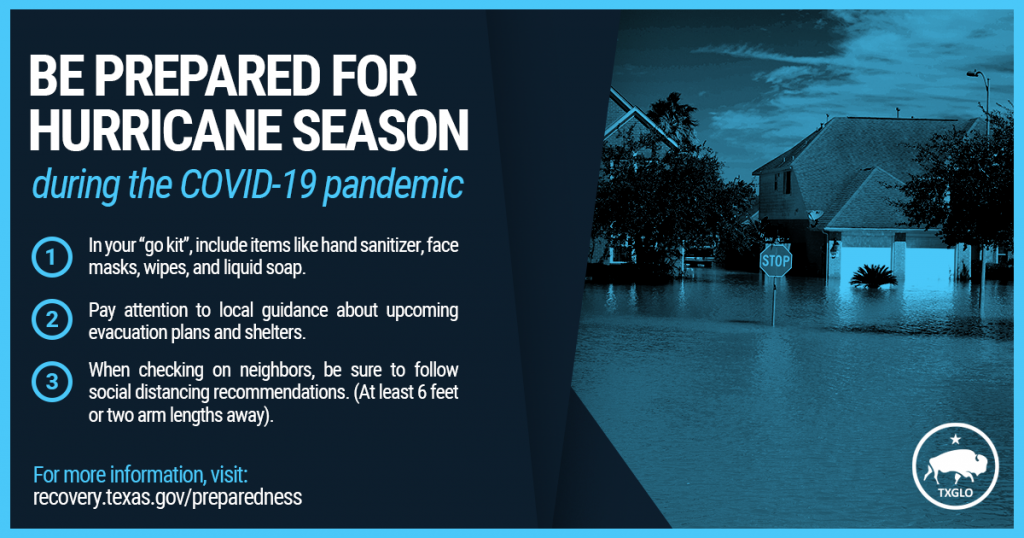
When it comes to hurricanes, 2020 is a different year in the most unpredictable ways. At the beginning of the year, people worldwide were hit by COVID-19 pandemic that left millions infected with an unknown deadly virus.
Surging Cases Of Coronavirus
In the middle of grappling with the pandemic, a surge in coronavirus cases, and continued national unrest, the US State of Texas is at the ready to prepare for hurricane season. This year’s timing couldn’t be any worse.
The first hurricane of the 2020 Atlantic hurricane season made landfall twice as a Category 1 storm. The entire hurricane season runs through November 30.
Above Normal Hurricane Forecast
An outlook issued by the National Oceanic and Atmospheric Administration’s Climate Prediction Center forecasts a 60% chance of above-normal activity this hurricane season, with 13 to 19 named storms. Of those storms, the center predicts 6-10 could become hurricanes, and three to six of those could be major hurricanes — Category 3 or higher. These high-intensity hurricanes typically bring heavy rains, storm surges, and possible tornadoes. (NOAA, 2020)
Therefore, hurricane preparedness is critical for the 2020 hurricane season, just as it is every year. Remember, you may have to adjust your preparedness actions based on the CDC and your local officials’ latest health and safety guidelines.
How Bad Can It Get?
A hurricane is a type of tropical cyclone, the generic term for a low-pressure system that generally forms in the tropics. Thunderstorms accompany a typical cyclone, and in the Northern Hemisphere, with a counter-clockwise circulation of winds near the earth’s surface.
Hurricanes and tropical storms can also spawn tornadoes and microbursts, create storm surges along the coast, and cause extensive damage from heavy rainfall. They are classified into five categories based on their wind speed, central pressure, and damage potential. Category Three and higher hurricanes are considered major hurricanes, though Categories One and Two are extremely dangerous and warrant your full attention.
Hurricanes can produce widespread torrential rains. Floods are deadly and bring destructive results. Slow-moving storms and tropical storms moving into mountainous regions tend to produce especially heavy rain. Flash flooding can also occur due to intense rainfall. We experienced this first-hand during Hurricane Harvey in September of 2017.
(Texas Department of State Health Services, 2020)

Be Ready With a Plan
The Texas Hurricane Center has put together a list of things to safeguard you and your family from a hurricane:
- Prepare an emergency supply kit – Include all the essentials your family and pets will need to shelter in place or evacuate. This year, the emergency kit should include sanitizer and other equipment recommended by the Centers for Disease Control and Prevention to help protect against the spread of COVID-19. (Ferman & Svitek, 2020)
- Create a communication plan with your family. Your family may not be together when a disaster happens. The best way to keep everyone safe is to make an emergency plan ahead of time.
- Sign up for your community or county warning system.
- You should know flood risks in your area.
- It’s important to know your evacuation routes.
- • Register for STEAR if you or anyone you know will need some assistance in an emergency event.
- Keep essential documents in a waterproof container; create password-protected digital copies.
- Protect your property; move valuables to higher levels; declutter drains and gutters.
- Follow weather alerts.
- Be cautious of any water on roads or in creeks, streams, storm drains, or other areas. Never attempt to cross flowing streams or drive across flooded roadways and always observe road barricades placed for your protection. Remember to ‘Turn Around Don’t Drown‘.
(Texas Hurricane Center 2020)
CDC recommends that you print important documents (e.g., emergency phone numbers, insurance information) before a hurricane strikes. Power outages during and after a hurricane can prevent you from accessing information online when you most need it.
Things You Should Do During Hurricane:
- Listen to radio or TV for regular updates on the situation
- Secure your home, close storm shutters, and secure outdoor objects or bring them indoors.
- Turn off utilities if instructed to do so. Otherwise, turn the refrigerator thermostat to its coldest setting and keep the doors closed.
- Turn off propane tanks. Avoid using your cell phone, except for serious emergencies.
- Ensure a supply of water for sanitary purposes such as cleaning and flushing toilets. Fill the bathtub and other large containers with water.
When to Evacuate
You should evacuate under the following :
If you are directed by local authorities to do so. Be sure to follow their instructions. If you live in a mobile home or temporary structure—such shelters are particularly hazardous during hurricanes no matter how fastened to the ground. If you live in a high-rise building—hurricane winds are stronger at higher elevations if you live on the coast, on a floodplain, near a river, or on an inland waterway. If you feel you are in danger.
If you are unable to evacuate, go to your wind-safe room. If you do not have one, follow these guidelines: Stay indoors during the hurricane and away from windows and glass doors.
Close all interior doors—secure and brace external doors. Keep curtains and blinds closed. Do not be fooled if there is a lull; it could be the storm’s eye – winds will pick up again. Take refuge in a small interior room, closet, or hallway on the lowest level. Lie on the floor under a table or another sturdy object.
(Galveston Texas, 2020)
Staying Safe After a Hurricane
In addition to preparing for a hurricane, it’s important to take steps to stay safe after a hurricane is over, for example:
- Avoid flooded areas: Take precautions before, during, and after a flood.
- Prevent carbon monoxide (CO) poisoning after the storm: Ensure your CO detector has working batteries. Place generators outside at least 20 feet from any door, window, or vent.
(CDC, 2020)
Works Cited
Center, T. H. (2020). Texas Hurricane Center. https://gov.texas.gov/hurricane.
Govt, N. O. A. A. (2020, May 21). Busy Atlantic hurricane season predicted for 2020. Busy Atlantic hurricane season predicted for 2020 | National Oceanic and Atmospheric Administration. https://www.noaa.gov/media-release/busy-atlantic-hurricane-season-predicted-for-2020.
24/7, C. D. C. (2020, June 1). Preparing for a Hurricane or Tropical Storm. Centers for Disease Control and Prevention. https://www.cdc.gov/nceh/features/hurricanepreparedness/index.html.
Texas, G. (2020). Hurricane Preparedness. Hurricane Preparedness | Galveston, TX – Official Website. https://www.galvestontx.gov/491/Hurricane-Preparedness.
Ferman, M., & Svitek, P. (2020, June 5). As Texas grapples with a pandemic, officials must also prepare for what could be an unusually active hurricane season. The Texas Tribune. https://www.texastribune.org/2020/06/05/texas-hurricane-preparation-2020-coronavirus/.
Texas Department of State Health Services, G. (2020). Get Ahead of What’s Ahead. txready.org. https://www.txready.org/be-informed/natural-disasters/hurricanes.html.
